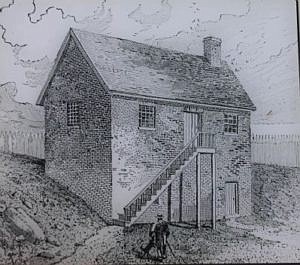One of the most famous exploits of the Civil War was the April 1862 mission led by James J. Andrews to infiltrate deep into Confederate territory with a goal to cut rail and communication lines between Atlanta and Chattanooga. The engine General was abandoned near Ringgold, Georgia, at the end of the epic Great Locomotive Chase, and the raiders all captured. The General and the raiders are memorialized at the Chattanooga National Cemetery.
The Confederate authorities reacted sternly, and on June 1, 1862, Andrews, who was a civilian, was sentenced to die. He and nine of his men remained in Swaim's Jail in Chattanooga, that site now bounded by the Unum parking lot on Lookout Street. Andrews' comrades resolved to help the condemned man escape, and engineered a break-out the night of June 2-3, 1862, with Andrews and Pvt. John Wollam of the 33rd Ohio Regiment escaping before the alarm was raised. Andrews was soon recaptured and executed.
Wollam, of Jackson County, Ohio, was described some years later as a "thin, wiry, tobacco-chewing scape-grace who would have laughed in the face of Azrael" [the angel of death]. Hiding on the bank, he cleverly misled his pursuers into thinking he had taken to the Tennessee River, and eventually his way downstream from Chattanooga. He had the bad luck of mistaking a Union riverboat for a Confederate craft, and came upon a party of Rebel soldiers containing a man who was in on his original capture. After about three weeks, Wollam rejoined some of his comrades in captivity in an Atlanta jail.
Fearing that they, too, would be executed, the remaining raiders plotted another escape. On the night of Oct. 16, 1862, they staged a breakout. Rushing the guards, the escapees broke into the streets of Atlanta. Wollam and a comrade, John R. Porter, hid for a period under some brush and leaves and then worked their way out of the city. Traveling at night, they had almost nothing to eat for 12 days. Wollam insisted on making their way to the Tennessee River, as he had nearly gotten away that way his last time.
Eventually they did so, about 25-30 miles below Bridgeport, Alabama. Stealing a canoe, they worked their way down the river at night, making it as far as Muscle Shoals before they had to return to dry land. Stealing another boat around Florence, Alabama, they walked into a Union camp near Corinth, Mississippi, on Nov. 18, 1862.
Wollam rejoined the 33rd Ohio, and returned to the Chattanooga area with his regiment in September 1863. His up-and-down luck intervened again, and Wollam was captured at Chickamauga, probably during his regiment's withdrawal on Sept. 20. Recognized as an Andrews Raider, he had an iron ball chained to his leg for a period, and was once again imprisoned in Atlanta. Joining him there was Col. William Clift of Soddy, captured on Oct. 24, 1863, while carrying dispatches from Union forces in Chattanooga to Knoxville.
Wollam eventually was released from his ball and chain, and with Clift and several others, on Jan. 5, 1864, the prisoners positioned a cot against a wall, which in the darkness kept them from being observed by the guards. Thus obscured, they dug a hole under the wall with a Bowie knife, until the hole was big enough to allow passage out. The escapees scattered, although Clift, Wollam and Levi Troxell of the 5th Iowa Cavalry hid in the woods for two days, not more than a mile and a half from Atlanta. Troxell departed Clift and Wollam on the third day, making his way to East Tennessee on his own. This time, Wollam avoided the Tennessee River, and with the 68-year-old Clift and possibly one other escapee, made his way through the mountains of northeast Georgia in the dead of a cold winter to a federal garrison in Polk County, Tennessee, not far from modern Benton.
Wollam served out his term of enlistment, and on July 20, 1864, was awarded the Medal of Honor for his role in the Andrews raid. He is reported to have resided in Ohio and Illinois until 1877, when he moved to Topeka, Kansas. He joined the surviving Andrews Raiders in 1888 at a reunion in Columbus, Ohio, and died in Topeka in 1890.
Local attorney and historian Sam D. Elliott is an award-winning author on Tennessee Civil War history.
